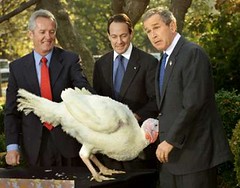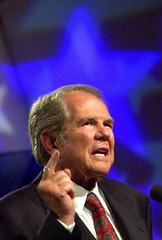A top Russian environmental official tried to reassure the population Tuesday by drinking a glass of water on television. But a spokesman for the World Wide Fund for Nature said the river faced "ecological catastrophe" from the 50-mile-long slick of chemicals floating toward the Russian border from China.Meanwhile, Der Spiegel (via the invaluable Salon.com) features this grim summary of the evironmental costs of China's economic miracle:
"There will be an effect on nature plants and fish will die and economic damage," said Ilya Mitasov, a Moscow-based spokesman for the global environmental organization.
The pollution will result in massive fish deaths and force city residents and industries to search for alternative sources of water, he told The Associated Press in a telephone interview.
The only way to get rid of the toxic chemicals including cancer-causing benzene is evaporation, but the water temperature would have to be 68 to start that process, Mitasov said. Currently it's about 50 and there is ice on some stretches of the river, which ultimately feeds into the Sea of Okhotsk.
"The benzene will remain in the ice until spring, and the (situation) will be dragged out," Mitasov said.
Even if water began flowing once again to the city's residents on Tuesday, the horrific environmental catastrophe reveals the flipside of the socialist economic miracle. Secretiveness and sluggish crisis management highlight the price the Chinese are paying for their boom. And even as Westerners envy the half-communist, half-capitalist country for its impressive growth figures and endless backyard market, China is no longer merely the world's factory. It is also the world's toxic waste dump.Of course, such attitudes aren't unique to China. I could cite our current Administration in the US, with its disbelief in global warming and its infinite faith in the power of more drilling (and foreign wars) to solve our energy issues. Or, going back a couple of administrations, I could mention former Secretary of the Interior James Watt, who did not think we needed to concern ourselves overmuch with conserving resources for future generations, because in his words, "I do not know how many future generations we can count on before the Lord returns." Such faith is touching, in a way, as is the faith of the Chinese Communist Party's materialists, who believe we can innovate our way out of any crisis we create, or at least can leave the mess for our children to take care of - as opposed to the faith of the Bush Administration, which preaches that the mess simply does not exist. But the grownups in the room, in China, America and elsewhere, realize that the longer we wait, the greater the reckoning. Whether the grownups can take charge from the greedy, selfish children who all too often seem to be treating the world as their playpen, before that playpen collapses under the weight of its own filth, remains to be seen.
China's rise as a global power, achieved with high economic growth rates, is reminiscent of the conditions in the era of early capitalism. Everything that drives production is good, and everything that slows it down -- safety technology, for example, that prevents industrial accidents from leading to massive factory explosions -- is harmful. The result is exploding tanks, burning factories, collapsing mine pits and all manner of toxic leaks. According to official statistics, 350 Chinese die each day in industrial accidents, but the unofficial figure is likely to be much higher. "Occupational safety is a serious problem, because the number of accidents and deaths remains high," said Wang Dexue, deputy director of the State Office of Occupational Safety, commenting on the horrifying figures from the country's manufacturing industries.
Adding to the problems are economic reforms that have made many businessmen greedy. China's laissez-faire brand of socialism doesn't prevent executives from spending their money on cars and villas instead of investing it in worker safety and environmental protection. Although the government is constantly vowing to monitor manufacturers more closely, local officials and party leaders are often in bed with the captains of industry in China. This Mafia-like alliance between the politically and economically ambitious is known as "local protectionism."
Chen Bangzhu, an environmental expert on Beijing's Parliamentary Council, says he recognizes an "irrational development" in his country. In an interview earlier this year, Pan Yue, the deputy minister of the government environmental agency, SEPA, predicted a bitter end to the economic miracle. "This boom will soon come to an end," he said in an interview with Der Spiegel, "because the environment isn't cooperating anymore." The negative consequences of the boom are devastating. Five of the world's 10 most polluted cities are in China. More than two-thirds of all Chinese rivers and lakes are turning into sewers -- even before the recent accident, the Songhua River was hardly a model of cleanliness -- and more than 360 million people have no access to clean drinking water. A toxic soup splashes through the country's waterways, while people living along the banks die from cancer at above-average rates. Nowadays, the then 72-year-old former party chairman Mao Zedong's legendary swimming outing in the Yangtze River in 1966 would no longer be seen as evidence of his strength, but more as a suicide attempt...
...The People's Republic, which could soon surpass the United States as the world's largest producer of greenhouse gases, has lost its ecological balance and is paying a heavy price as a result. About 400,000 people die prematurely each year because of the polluted air they breathe. Experts estimate the annual loss at 8 to 15 percent of the gross domestic product -- or up to $250 billion -- a figure that does not include the costs of treating cancer, skin conditions and bronchitis.
The Chinese leadership has become increasingly concerned about the possibility that environmental damage could jeopardize China's industrial ascent. After the Harbin incident, even Prime Minister Wen Jiabao admitted that the environmental situation is "bleak" and called for "sustainable growth." But many other party leaders see this kind of talk as nothing but Western social nonsense. They prefer to follow the lead of Mao, who summed up his take on the environment in 1958 when he said, "Make the high mountain bow its head; make the river yield its way." Today's comrades, profiting handsomely from industrial growth, believe it is cheaper to clean up in the distant future than to invest in protecting the environment today.








